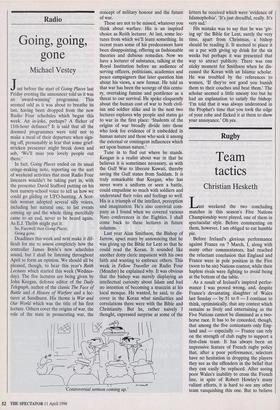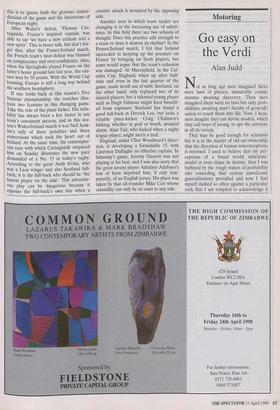Rugby
Team tactics
Christian Hesketh
Last weekend the two concluding matches in this season's Five Nations Championship were played, one of them in spectacular style. Before commenting on them, however, I am obliged to eat humble pie.
Before Ireland's glorious performance against France on 7 March, I, along with many other commentators, had reached the reluctant conclusion that England and France were in pole position in the Five (soon to be six) Nations contest, while their hapless rivals were fighting to avoid being at the bottom of the table.
As a result of Ireland's inspired perfor- mance I was proved wrong, and, despite France's devastating slaughter of Wales last Sunday — by 51 to 0 — I continue to think, optimistically, that any contest which remains as lively and entertaining as the Five Nations cannot be dismissed as a two- horse race. It has to be conceded, though, that among the five contestants only Eng- land and — especially — France can rely on the strength of club rugby to support a first-class team. It has always been an impressive feature of French rugby policy that, after a poor performance, selectors have no hesitation in dropping the players they see as the offenders in the belief that they can easily be replaced. After seeing poor Wales's inability to cross the French line, in spite of Robert Howley's many valiant efforts, it is hard to see any other team vanquishing this one. But to believe this is to ignore both the glorious contra- dictions of the game and the limitations of European rugby. After Wales's defeat, Thomas Cas- taignede, France's inspired captain, was able to say 'we have a new attitude and a new spirit'. This is brave talk, but don't for- get that, after the France/Ireland match, the French team's near-defeat was blamed on complacency and over-confidence. Also, when the Springboks played France on the latter's home ground late last year, the visi- tors won by 50 points. With the World Cup looming, Europe is still a long way behind the southern hemisphere. If one looks back at this season's Five Nations championship, the matches illus- trate two features in this changing game. Take the role of the place kicker. His relia- bility has always been a key factor in any team's consistent success, and in this sea- son's Wales/Ireland match it was Neil Jenk- ins's tally of three penalties and three conversions which took the heart out of Ireland. At the same time, the contemptu- ous ease with which Castaignede outpaced him on Sunday illustrates the new pace demanded of a No. 15 in today's rugby. According to the great Andy Irvine, who was a Lion winger and also Scotland full- back, it is the full-back who should be 'the fastest player on the side'. This adventur- ous play can be dangerous because it exposes the full-back's own line when a counter attack is mounted by the opposing side.
Another area in which team tactics are changing is in the increasing use of substi- tutes. In this field there are two schools of thought. Does this practice add strength to a team or does it destroy its rhythm? In the France/Ireland match, I felt that Ireland succeeded in keeping up the pressure on France by bringing on fresh players, but some would argue that the team's cohesion was damaged. At Murrayfield, in the Cal- cutta Cup, England, when up after half- time and even in the last quarter of the game, made lavish use of subs. Scotland, on the other hand, only replaced two of its injured players, but a talented young player such as Hugh Gilmour might have benefit- ed from exposure. Scotland has found a good full-back in Derrick Lee, but lacks a reliable place-kicker. Craig Chalmers's kicking, whether at goal or touch, aroused alarm. Alan Tait, who kicked when a rugby league player, might merit a trial.
England, under Clive Woodward's direc- tion, is developing a formidable 15, with Laurence Dallaglio an effective captain. In Saturday's game, Jeremy Guscott was not playing at his best, and I was also sorry that the great sevens player Adedayo Adebayo's loss of form deprived him, if only tem- porarily, of an English jersey. His place was taken by that all-rounder Mike Catt whose versatility can only be an asset to any side.



































































 Previous page
Previous page